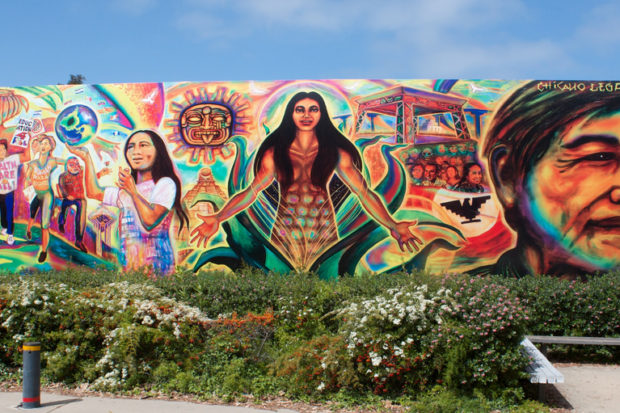
By Jonathan Luevano Felix
What is Chicano? What does it mean to be a Mexican-American person in Central California? Once we realize the existential condition, then the social-political cultural phenomenon becomes absurd.
The cultural trend tends in a generalized format, to be tied to social and political constructs or struggles that focus on overcoming aspects of oppression by “decolonizing” the mind. The struggle against the White man’s imperialism is an ongoing condition or position that signifies or identifies the Chicano. This social-political cultural format is a teleological answer or in simpler terms, it serves as a framework of purpose for the Chicano in this world. Thus, from this framework, to be a Chicano means to be involved in social and political struggles that go as far back to the 16th century to our post-modern world. But is that all that the Chicano consists of? Surely not.
Existentialism is a philosophy that focuses on the inevitable individual human condition of meaninglessness and incompleteness. Existentialists emphasize that there is no inherent essence (human nature) or purpose in the human being’s existence. From this perspective, it is the individual’s responsibility to create one’s own values through artistic stylization of oneself.
Nezahualcoyotl was a philosopher, warrior, poet and ruler of the city of Texcoco in 14th century, pre-Columbian Mexico. Nezahualcoyotl hinted at the vanity and meaninglessness of the world. If one pays close attention to his message, one can find that there is a philosophical framework that rests on the existential condition.
Everything under the sun is vanity. From this perspective, it is obvious that Nezahualcoyotl felt the incompleteness of the world and consequently relied on poetry to create meaning in the world. All he has are his poems that stem from the willingness to create value in a valueless world.
What does that say about social and political constructs, about teleology or the purpose of the Mexican-American person in this world? If one is to start from Nezahualcoyotl`s position then the whole decolonizing process becomes an absurdity in terms of purpose. Nezahualcoyotl’s purpose was to overcome the meaninglessness of the world and create meaning through poetry and not through a kind of a fixed teleology focused on overcoming colonization. This type of cultural phenomenon hints at one that is artistic rather than social-political for the Chicano.
The purpose of this work is not to provide an in-depth account of the existential condition of the Chicano. In much more generalized terms, the existential format is extended by the writings of Octavio Paz and later by other Mexican existential philosophers. Also, if one pays close attention to the condition of the immigrant or the Chicano who lives in California, one will find that there is a great degree of alienation that extends because of the complex cultural and social political condition that exists. Mexican Immigrants as well Chicanos are immersed in a social-political world that entails alienation from the Mexican culture but also from the White-American culture. If the world is meaningless, then no social and political teleology will be sufficient to create value or meaning in this world. One must create one’s own values. From an existential perspective, the social and political framework of the Chicano in this world becomes absurd.
One can ultimately challenge the existential position through Michel Foucault’s philosophy in relying on the idea everything consists of power and human nature consists of power. The social world consists of power that is forced upon individuals and individuals in society have a responsibility to overcome oppression.
Foucault’s ethical approach to social-political conditions is subjective and relies on the concept of parrhesia, or fearless speech. He advances the idea that to be ethical in the world, one must employ one’s beliefs upon the world and speak against oppression and power. Examples are Socrates, Malcolm X, Cesar Chavez, etc. But from Foucault’s framework, although meaning is created by challenging the world that is largely constituted by social-political power constructs, the overcoming of the oppressive world is tied to the subject and its own truth. Thus the social-political phenomenon is still meaningless.
The development of thought ends here for the purpose was to make an argument and not elaborate on philosophical terms, the historical development of existential thought in Mexico or Foucault’s ethics.
For now, I have only provided an existential framework that challenges the status quo, social-political cultural position of the Chicano in this world. As a challenge to the existential position, I have also provided a Foucauldian model of power that focuses on overcoming oppression but it is insufficient in supporting a social-political cultural purpose. Thus the social-political cultural phenomenon becomes absurd.
*****
Jonathan Luevanos Felix was born and raised in Fresno. He holds a master of arts in philosophy from San Francisco State University. He is currently involved with community organizations from the Bay Area and Fresno. Contact him at jluevanosfelix@gmail.com.
